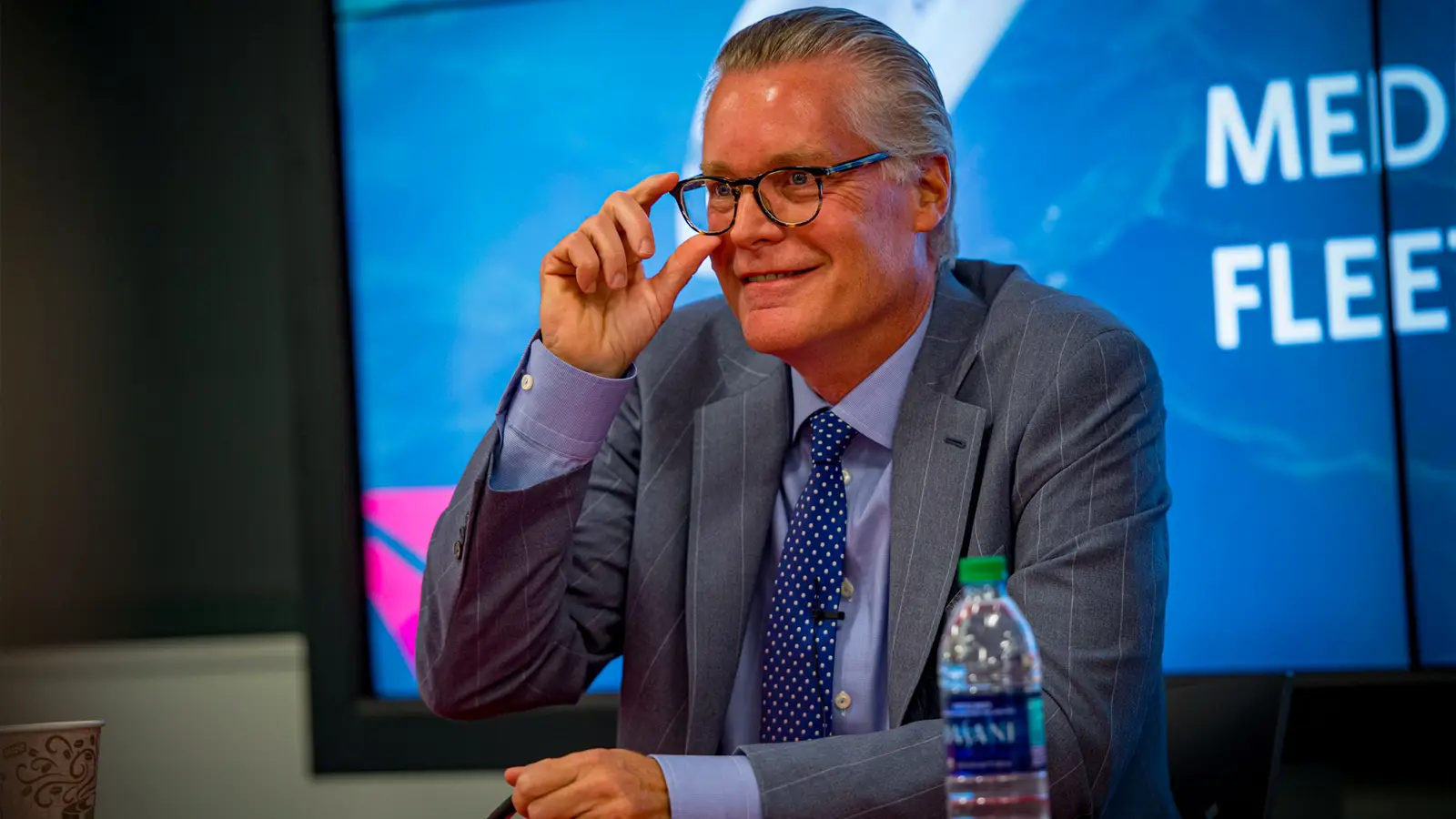Copyright Simple Flying

The key to Delta Air Lines' success in recent years has been the premium brand it has built. The carrier's identity today centers around Delta One Suites, glass doors, and a wine list created by master sommeliers that includes far too many bottles to count. The man behind that strategy, for the most part, is Delta Air Lines CEO Ed Bastian. However, he is not sitting behind those doors as you might expect. Rather, he is often in the Main Cabin or perhaps Comfort+, where he walks the aisles and chats with flight attendants, all while quietly trying to examine what pieces of the experience are actually more valuable to customers. It is not a marketing stunt by any stretch of the imagination, but rather a part of Ed Bastian's recurrent and extremely visible leadership philosophy, which encourages Delta leaders to listen more than they talk and make decisions anchored in what frontline employees and everyday travelers actually live through on a Tuesday afternoon flight to Atlanta. Bastian's philosophy calls for Delta's leadership team to look beyond what boardroom slides say and to what passengers actually care about. In an era when premium cabins are the principal profit engines for airlines across the board, Bastian's choice sounds somewhat counterintuitive. Nonetheless, that is exactly the point as he observes service flows, seat ergonomics, and the pain in the boarding process that is much harder to see from seat 1A. We analyze how the CEO of an airline synonymous with premium travel often flies at the back of the plane, and how his trips help inform strategy and culture. We further discuss what this reveals about Delta's competitive edge in the market. Who Exactly Is Ed Bastian? Ed Bastian is a career operator and financier whose path to Delta Air Lines runs through both auditing and consumer goods. A St. Bonaventure-trained accountant, Ed Bastian's career began at Price Waterhouse, where, as a young auditor, he was involved in the uncovering of a major fraud scandal at J. Water Thompson, before he moved to PepsiCo's Frito-Lay division as overseer of international finance. He later joined Delta Air Lines in 1998 as the Vice President of Finance, before he left briefly in 2005 to serve as the CFO of Acuity Brands. He later returned to the carrier just a few months later at the request of CEO Gerald Grinstein to steer Delta through bankruptcy. In 2007, he became the airline's president and was later appointed CEO in May 2016. This mix of experiences at the carrier, which includes discipline, P&L ownership, and a front-row seat to a complex merger, alongside a turnaround under Chapter 11 bankruptcy, helps shape his style as an operator. He is known for walking the aisles and directly soliciting feedback in the Main Cabin, a choice consistent with his recurring advice that leadership should not be a popularity contest. He continues to cite Delta's people-first culture. Under his tenure, the airline eventually doubled down on premium products and reliability while delivering (reducing the company's overall debt burden) and expanding its partnerships with other carriers, all while his center of gravity remained operational. He understands the customer, empowers employees, and keeps the carrier's overall schedule clean, all while profitability ultimately follows. How Has Delta Air Lines Changed Under Ed Bastian's Leadership? Since taking the helm at the carrier in 2016, Ed Bastian has steered the airline through a shift from being a large airline to a premium, reliability-led platform that features diversified earnings. From an operational perspective, Delta Air Lines rebuilt its schedule discipline and service consistency, pairing tighter operations with visible frontline engagement and faster operational recovery playbooks, all advantages that showed up during holiday travel peaks and irregular operations' resilience. From a commercial standpoint, the airline leaned hard into overall product segmentation, with Delta One Suites and Premium Select on long-haul routes, a cleaner ladder between First, Comfort+, and the Main cabin in domestic markets. The airline also added Basic Economy to lower the fare fence for customers. Overall, network investments were matched by physical ones, including wholesale rebuilds at LaGuardia Airport (LGA) and Los Angeles International (LAX), alongside new facilities at Salt Lake City International Airport (SLC). The airline also modernized its lounge network significantly under Bastian's leadership. Ed Bastian pushed towards revenue diversification, pushing for a larger and more profitable SkyMiles ecosystem and scaling Delta TechOps as a third-party MRO business, alongside balance-sheet repair and overall pandemic-related deleveraging. He also kept the airline's refinery active in order to manage jet fuel exposure and advance Sustainable Aviation Fuel (SAF) partnerships. The airline's culture remained a key part of its business model, though loyalty changes ultimately drew pushback and were modestly recalibrated. A Deeper Look At Why Ed Bastian Flies Economy Ed Bastian often chooses to travel economy because it keeps him close to the airline's real product and the trade-offs associated with it, according to a recent analysis from Fortune. Sitting mid-cabin allows Bastian to watch the entire passenger journey from end to end, including boarding order frictions, overhead bin availability, Wi-Fi stability, and seatback glitches, alongside galley bottlenecks and larger lavatory queues. He also believes that doing so maintains upgrade fairness, as he is not displacing a Medallion member or a paid premium customer when availability in the front cabin is tight, reinforcing the fact that revenue and loyalty should come first. Ultimately, blending into a crowd reduces the observer effect, so he sees unscripted service and hears candid feedback from crews and travelers without the performance that follows an executive's name. It is, at the end of the day, a cultural signal that cost discipline starts at the top, especially during periods of peak passenger loads and irregular operations. This allows leaders to test the baseline before polishing fringe details within service. From a practical standpoint, these aisle conversations surface into quick wins, including improved catering counts, cart flows, and app prompts, all of which can be fixed at last, all while chronic issues feed into larger cabin redesigns. Lastly, it helps build credibility with employees, as the CEO has felt a 31-inch pitch on a full Tuesday morning aircraft turn, debating seat intensity, boarding changes, and overall service pacing. What Is Ed Bastian's Leadership Philosophy? Ed Bastian's overall leadership philosophy is grounded in integrity and maintaining strong relationships with employees. He believes that leaders earn trust by showing up where work happens, listening to both customers and employees, and then making values-anchored decisions. This leads to his fairly simple leadership stack, which includes taking care of employees, who take care of customers, and thus the business ultimately takes care of itself under this model. This eventually translates into visible, hands-on management, with regular station visits, ride-alongs, and open forums, all of which are paired with rigorous operational discipline surrounding safety, reliability, and overall costs. He prefers direct observation and data, building short feedback loops from crews and customers into its product, schedule, and technical choices. Bastian blends servant leadership with overall accountability, setting the bar high, equipping the carrier to clear it, celebrating team wins, and acknowledging his team's mistakes while taking accountability. He especially values overall fairness and credibility, a key reason why he will often forgo special treatment on the road and experience the standard product himself. Culturally, he keeps purpose front and center, taking pride in service, dignity in his work, and sharing success through recognition and overall profit-sharing. The through-line is ultimately humble confidence, as he encourages leaders across the company to be present, keep promises, and let frontline truth guide overall strategy. How Does Ed Bastian Present Delta To Investors? Similar to his employee messaging, Ed Bastian positions Delta as a people-first business. He indicates that the carrier is a diversified premium travel platform that generates durable cash flows. He leads with operational credibility, which includes high completion factors, on-time rates, and safety protocols, all while pivoting to revenue quality, a mixed shift towards premium cabins, and continued loyalty monetization that allows the airline to outperform even when demand is relatively weak. Delta SkyMiles and the American Express partnership are presented as capital-light moves, both of which emerge as recurring profit engines. Delta TechOps is a third-party Maintenance, Repair, and Overhaul (MRO) platform that adds industrial breadth for the carrier, underscoring cost and capacity discipline on its own, all while upgauging, engaging in fleet renewal, and improving productivity. The airline follows a relatively simple capital allocation ladder, one that involves investing in product and technology, all while delivering and then returning cash to shareholders through buybacks and dividends. Bastian uses cohort-style key performance indicators and clear bridge charts from operations to margin to cash, all of which create continued investor confidence. Overall risks, including fuel, labor, weather, geopolitics, and loyalty policy risks, are all addressed by mitigants and diversified partnerships. Across the board, the airline pushes forward a consumer-friendly brand, with ambition that is only constrained by the airline's balance sheet. What Are Our Key Takeaways? At the end of the day, Ed Bastian's customer-friendly attitude is emblematic of how the CEO treats both his employees and those whom he sees as guests on his flight. As the leader of an airline synonymous with service, Bastian is the best example of how Delta wants to be viewed by its passengers. The airline is the most financially successful carrier of the last decade, and for good reason. Maintaining strong relationships with passengers has been a critical part of this pursuit, and it has allowed the airline to ensure that it can command a price premium, even in competitive domestic markets. Ultimately, Ed Bastian will leave a strong legacy at Delta Air Lines, and there is no sign that his time at the carrier is coming to an end. His ability to relate directly to customers and take their feedback into account over the years has continued to motivate his success.



